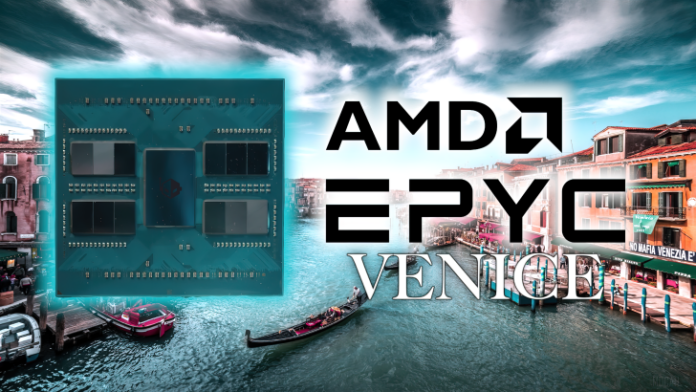
AMD's next-generation EPYC Venice CPUs based on the Zen 6 core architecture are going to feature support on the brand-new SP7 socket, according to the latest rumor by Yuuki_AnS.
AMD's Next-Gen SP7 Platform To Replace SP6 With Support For Zen 6-Powered EPYC Venice CPUs
AMD currently has its Zen 4 offerings out in the market as the EPYC 9004/8004 featuring Genoa, Bergamo, and Siena lineups. These EPYC families are compatible with the SP5 (LGA 6096) & SP6 (LGA 4094) platforms. AMD will utilize the same platform with its upcoming Zen 5 offerings that come in a diverse range of Turin-based products next year but it looks like SP5/SP6 will be totally replaced by a new platform around 2025-2026.
This new platform will be known as SP7 and based on the new information, the socket will support AMD's Zen 6-based EPYC Venice lineup which will also feature a diverse range of SKUs and families. Little is known at the moment about the platform but the LGA 6096 socket is currently the largest socket which is shipping to data center customers with support of up to 128 core CPUs. Intel's LGA 7529 socket for next-gen Xeon AP CPUs is a much bigger socket but it is not confirmed if we will get that in the Birch Stream platform since reports are inclining towards the use of the standard Xeon SP design based around the LGA 4710 socket.
Although little details are available on the AMD EPYC Venice family, the information also suggests that the SP7 socket will support both 12-channel and 16-channel memory along with faster DIMM speeds on the latest generation of PCIe interfaces (Gen6). We do know that AMD's Zen 6 is based on a 2nm process node and codenamed "Morepheus". At least that's what the initially leaked info says.

We are still a year away from the AMD Zen 5 "Nirvana" family of CPUs but Zen 6 development is on the way and we are likely to hear more about the family in upcoming events such as the Financial Analyst Day which was hosted last year, where the company unveiled several future product lines and its latest roadmap.
AMD Zen CPU / APU Roadmap:
| Zen Architecture | Zen 6 | Zen 5 | Zen 4 | Zen 3+ | Zen 3 | Zen 2 | Zen+ | Zen 1 |
|---|---|---|---|---|---|---|---|---|
| Core Codename | Morpheus | Nirvana | Persphone | Warhol | Cerebrus | Valhalla | Zen+ | Zen |
| CCD Codename | TBA | Eldora | Durango | TBC | Brekenridge | Aspen Highlands | N/A | N/A |
| Process Node | 3nm/2nm? | 4nm/3nm | 5nm/4nm | 6nm | 7nm | 7nm | 12nm | 14nm |
| Server | EPYC Venice (6th Gen) | EPYC Turin (5th Gen) | EPYC Genoa (4th Gen) EPYC Siena (4th Gen) EPYC Bergamo (4th Gen) | N/A | EPYC Milan (3rd Gen) | EPYC Rome (2nd Gen) | N/A | EPYC Naples (1st Gen) |
| High-End Desktop | TBA | Ryzen Threadripper 8000 (Shamida Peak) | Ryzen Threadripper 7000 (Storm Peak) | N/A | Ryzen Threadripper 5000 (Chagal) | Ryzen Threadripper 3000 (Castle Peak) | Ryzen Threadripper 2000 (Coflax) | Ryzen Threadripper 1000 (White Haven) |
| Mainstream Desktop CPUs | TBA | Ryzen 8000 (Granite Ridge) | Ryzen 7000 (Raphael) | Ryzen 6000 (Warhol / Cancelled) | Ryzen 5000 (Vermeer) | Ryzen 3000 (Matisse) | Ryzen 2000 (Pinnacle Ridge) | Ryzen 1000 (Summit Ridge) |
| Mainstream Desktop . Notebook APU | TBA | Ryzen 8000 (Strix Point) Ryzen **** (Krackan Point) | Ryzen 7000 (Phoenix) | Ryzen 6000 (Rembrandt) | Ryzen 5000 (Cezanne) Ryzen 6000 (Barcelo) | Ryzen 4000 (Renoir) Ryzen 5000 (Lucienne) | Ryzen 3000 (Picasso) | Ryzen 2000 (Raven Ridge) |
| Low-Power Mobile | TBA | Ryzen 8000 (Escher) | Ryzen 7000 (Mendocino) | TBA | TBA | Ryzen 5000 (Van Gogh) Ryzen 6000 (Dragon Crest) | N/A | N/A |
WccftechContinue reading/original-link]





